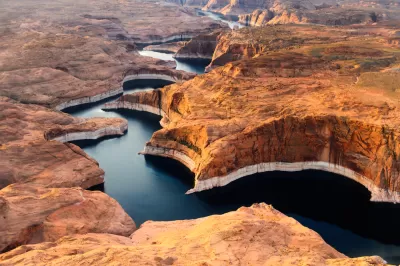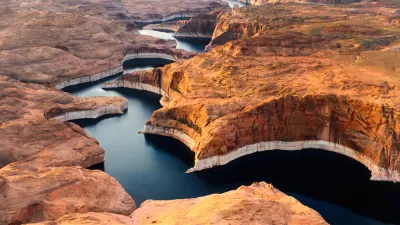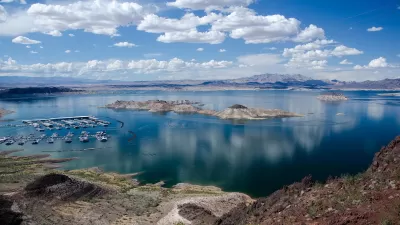In the throes of a historic megadrought, three Southwestern states will make deep reductions in their water usage to preserve diminishing resources.

After the federal government declared a historic water shortage for Lake Mead this summer, California, Arizona, and Nevada have agreed to reduce the amount of water they procure from the Colorado River in an effort to save one million acre-feet from leaving the reservoir in the next two years. As reported by Jaweed Kaleem and Ian James, "Water agencies in Southern California, Arizona and Nevada agreed to find water savings from various sources and split the $200-million cost with the federal government."
As water levels in Lake Mead and Lake Powell, the Colorado River's other major reservoir, continue to decline, experts say states may have to make even deeper cuts to adapt to a future with less water. "The new deal, called the 500+ Plan, nearly doubles the water reductions that the three states — which make up the lower basin of the river — negotiated in 2019 under what is called the drought contingency plan." The deal is a step toward correcting over-allocated water rights, but environmental groups say upriver states must also reduce their usage. Meanwhile, Utah is proposing a controversial new pipeline that would draw more water to that state.
Local tribes hold 20 percent of water rights and have contributed crucial efforts, yet have remained largely unrecognized in official negotiations. During this latest round of agreements, leaders from the Gila River Indian Community and the Colorado River Indian Tribes were present as signatories.
FULL STORY: California, Arizona and Nevada agree to take less water from ailing Colorado River

Planetizen Federal Action Tracker
A weekly monitor of how Trump’s orders and actions are impacting planners and planning in America.

Chicago’s Ghost Rails
Just beneath the surface of the modern city lie the remnants of its expansive early 20th-century streetcar system.

San Antonio and Austin are Fusing Into one Massive Megaregion
The region spanning the two central Texas cities is growing fast, posing challenges for local infrastructure and water supplies.

Since Zion's Shuttles Went Electric “The Smog is Gone”
Visitors to Zion National Park can enjoy the canyon via the nation’s first fully electric park shuttle system.

Trump Distributing DOT Safety Funds at 1/10 Rate of Biden
Funds for Safe Streets and other transportation safety and equity programs are being held up by administrative reviews and conflicts with the Trump administration’s priorities.

German Cities Subsidize Taxis for Women Amid Wave of Violence
Free or low-cost taxi rides can help women navigate cities more safely, but critics say the programs don't address the root causes of violence against women.
Urban Design for Planners 1: Software Tools
This six-course series explores essential urban design concepts using open source software and equips planners with the tools they need to participate fully in the urban design process.
Planning for Universal Design
Learn the tools for implementing Universal Design in planning regulations.
planning NEXT
Appalachian Highlands Housing Partners
Mpact (founded as Rail~Volution)
City of Camden Redevelopment Agency
City of Astoria
City of Portland
City of Laramie





























